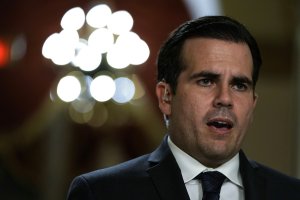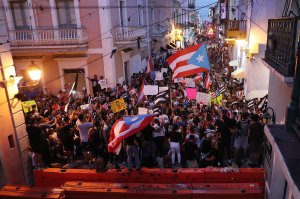Puerto Rico Gov. Ricardo Rosselló announced Sunday that he will not run for reelection next year and is resigning as the president of the New Progressive Party, following protests over the past week.

“A huge portion of the population is unhappy and I recognize it,” Rosselló said on Facebook Live. “I’ve heard you, I love the island and people. … Today I have the responsibility to direct my strengths to try to find alternatives so that with God we may be able to move forward.”
Rosselló is two and a half years into his four year term.
“I’m going to be looking forward to turning over power to the person elected democratically,” he said.
Rosselló did not say he would resign as governor of the US territory, upsetting residents who have been calling for his resignation after offensive private chat messages between Rosselló and his inner circle were made public last week.
“We want him gone, that’s it,” Xavier Garcia, 28, said. “It’s about respect.”
Jomaries Amezaga, 40, told CNN she knew Rosselló wasn’t going to step down.
“He’s like a little child having a tantrum. He’s lived an easy life of privilege and he doesn’t want to give it up,” Amezaga said.
Jenniffer González-Colón, Puerto Rico’s resident commissioner in Washington, also called for his resignation Sunday.

“It is a good first step but he must resign as governor and allow another to finish the term,” González-Colón said in a statement. She also serves as the vice president of the New Progressive Party.
The scene outside of La Fortaleza, the governor’s mansion, was like a massive block party after the announcement, in stark contrast to the tense protests in recent days. People yelled anti-Rosselló chants, waved Puerto Rican flags and blasted music. Vendors were selling “resign Rosselló” T-shirts.
Rafael “June” Rivera Ortega, secretary general of the New Progressive Party, said in a statement that working with Rosselló “has been a true honor.” After a new party president has been chosen, Ortega said he too will step down as secretary general.
“During these two and a half years, we have made great progress in terms of the reorganization of our party, reinforcing the message of Statehood, and we have been able to carry out multiple special elections without controversy, creating unity of our party,” Ortega said.
Governor not considering resigning
Last week, the Center for Investigative Journalism published nearly 900 pages of leaked chats from the governor’s private Telegram Messenger group, in which he and 11 top aides and Cabinet members exchanged profanity-laced, homophobic and misogynistic messages about fellow politicians, members of the media and celebrities. In one, Christian Sobrino Vega, then Puerto Rico’s chief financial officer, appeared to joke about those who died in Hurricane Maria.
Puerto Rico’s Justice Department has issued summonses for everyone involved in the private chat group. They will be ordered to appear before Justice Department officials to have their phones inspected, department spokeswoman Mariana Cobian said.
As protests continued last week, Rosselló consistently refused to step down. In a statement posted to Twitter on Thursday, he said he would continue to work toward regaining the Puerto Rican people’s trust.
“I recognize the challenge that I have before me because of the recent controversies, but I firmly believe that it is possible to restore confidence and that we will be able, after this painful process, to achieve reconciliation,” he said.
On Friday, his official Instagram account shared images of the governor at work, as if it were a typical day for his administration. The same day, Public Affairs Secretary Anthony Maceira said that the governor “is not considering resignation.”
New allegations of corruption
The leaked messages were not the only thing driving the protests. Demonstrators have also alleged government corruption, as the island battles high poverty rates, crushing debt and a painful recovery from 2017’s devastating Hurricane Maria.
On Saturday, Rosselló’s longtime family friend and business partner, Yosem E. Companys, claimed in an interview with news outlet NotiCel that the governor had accepted money from the island’s legislature for access to his father, a former governor. Companys claimed Rosselló told him he kept up to a million dollars in bank accounts, according to the report.
Rosselló said on Twitter that the allegations were “totally false.”
“It is truly lamentable and disappointing that a person which I considered a friend would make such ill-intentioned and false comments,” the governor tweeted.
Companys told NotiCel that the payments came up when he was discussing a business investment with Rosselló.
“Ricky told me he had all the money we needed. I asked him if it was family money,” Companys told NotiCel.
“He told me, ‘Don’t say anything, but basically I get paid around $100,000 to $200,000 as adviser to the legislature and I don’t have to do anything. The only thing I have to do is when they want to contact my dad, I give them access,” Companys said.
Companys said he asked Rosselló whether he thought it was unethical, according to the report, and that Rosselló told him, “I am on their payroll; that’s how things function in Puerto Rico.”
The exchange occurred between 2006 and 2007, Companys said.
Committee checks possible impeachable offenses
The president of Puerto Rico’s House of Representatives, Carlos “Johnny” Méndez, created a special committee Friday to advise him on whether the governor committed impeachable offenses.
The impeachment research committee includes three attorneys who will have 10 days to provide Méndez with a detailed report, according to a news release from his spokesman, Raúl Colón.
The committee will evaluate the content of the leaked messages between Rosselló and Cabinet members and determine if there’s proof Rosselló committed a crime, Méndez said.
“We are here to order this evaluation, one that will be transparent and responsible,” he said. “I thank this group of lawyers for giving a step forward in this historic moment for Puerto Rico. We will thoroughly evaluate the conclusions of this committee so we can proceed.”
If it is found that the governor did commit impeachable acts, and a vote to impeach passes the House, it goes to the Senate and a trial presided over by the head of the Supreme Court, with the senators as jurors. A two-thirds vote is needed in both chambers for the impeachment to go through.




















